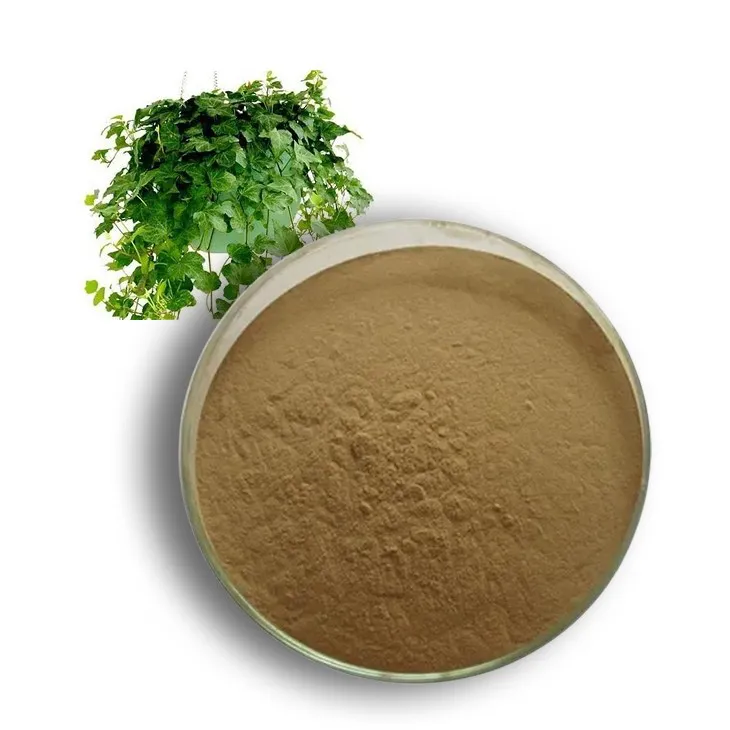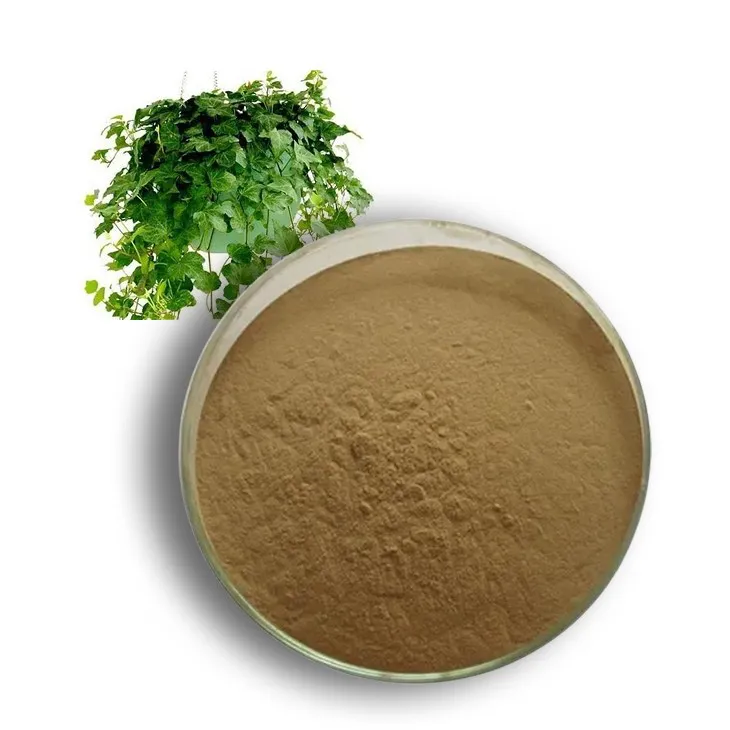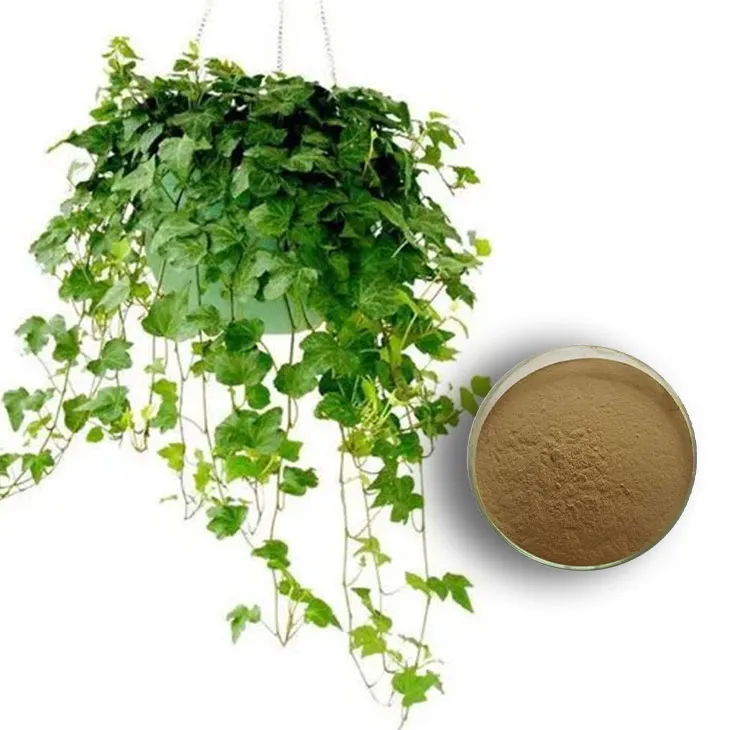- 0086-571-85302990
- sales@greenskybio.com
Benefits of Ivy Extract in Cattle Feed.
2024-11-12

1. Introduction
In modern cattle farming, the search for natural and effective additives in cattle feed is constantly ongoing. Ivy Extract has emerged as a promising candidate with a wide range of potential benefits. This article will explore the various advantages that Ivy Extract can offer when incorporated into cattle feed.

2. Nutritional Benefits
2.1 Provision of Essential Elements
- Ivy Extract contains a variety of essential minerals such as potassium, calcium, and magnesium. Potassium is crucial for maintaining proper nerve and muscle function in cattle. It helps in the transmission of nerve impulses, which is essential for normal movement and behavior of the animals. For example, a deficiency in potassium can lead to muscle weakness and reduced feed intake.
- Calcium is well - known for its role in bone formation and maintenance. In growing cattle, a sufficient supply of calcium is necessary for the development of strong bones and skeletal structure. Ivy extract can contribute to the overall calcium intake, reducing the risk of skeletal disorders such as rickets in young calves.
- Magnesium is involved in many enzymatic reactions in the body. It plays a role in carbohydrate and protein metabolism. Adequate magnesium levels, which can be supplemented by ivy extract, help in efficient energy production from feed, ensuring that the cattle have the energy they need for various physiological functions.
2.2 Bioactive Molecules for Energy Boost
- Ivy extract is rich in bioactive compounds such as flavonoids. Flavonoids have been shown to have antioxidant properties. But they also play a role in energy metabolism. They can enhance mitochondrial function, which is the powerhouse of the cell. By improving mitochondrial function, flavonoids in ivy extract can increase the production of adenosine triphosphate (ATP), the energy currency of the cell. This leads to increased energy levels in cattle, allowing them to be more active, which is beneficial for grazing, movement, and general well - being.
- Another group of bioactive molecules in ivy extract are saponins. Saponins can improve the digestibility of feed. They act on the cell walls of plants in the feed, breaking them down and making the nutrients more accessible to the cattle. This improved digestibility means that more energy can be extracted from the feed, contributing to better energy balance in the animals.

3. Health Benefits
3.1 Antioxidant Capacity Enhancement
- Oxidative stress is a common problem in cattle, especially in those exposed to environmental stressors such as high - temperature environments or poor - quality feed. Ivy extract, with its antioxidant components like flavonoids and phenolic acids, can help combat oxidative stress. These antioxidants scavenge free radicals, which are unstable molecules that can damage cells and tissues. By reducing the number of free radicals, ivy extract can protect the cells of the cattle from oxidative damage.
- Enhanced antioxidant capacity also has implications for the immune system. A reduction in oxidative stress can lead to a more effective immune response. Cattle with better antioxidant status are more likely to resist infections and diseases, as their immune cells are better protected from damage and can function optimally.
3.2 Disease Prevention
- One of the significant benefits of ivy extract in cattle feed is its potential to reduce the incidence of certain diseases. For instance, it can play a role in preventing respiratory diseases. Respiratory infections are common in cattle, especially in crowded or poorly ventilated housing conditions. The antioxidant and anti - inflammatory properties of ivy extract can help keep the respiratory tract healthy. It can reduce inflammation in the lungs, making it less likely for bacteria and viruses to cause infections.
- Ivy extract may also have a role in preventing digestive disorders. The saponins in it can help maintain a healthy gut microbiota. A balanced gut microbiota is essential for proper digestion and absorption of nutrients. By promoting a healthy gut environment, ivy extract can reduce the risk of digestive problems such as diarrhea and bloat, which can be costly and detrimental to the health and growth of cattle.

4. Growth and Development Benefits
4.1 Muscle Mass Increase
- The bioactive molecules in ivy extract can influence muscle development in cattle. The increased energy availability due to improved digestibility and enhanced mitochondrial function can be directed towards muscle growth. Additionally, some components in ivy extract may stimulate the production of growth factors related to muscle development. These growth factors can promote the proliferation and differentiation of muscle cells, leading to an increase in muscle mass over time.
- During the growth phase of cattle, especially in beef cattle, increasing muscle mass is highly desirable. It not only improves the carcass quality but also can lead to higher economic returns for farmers. Ivy extract can be a natural and cost - effective way to enhance muscle development in cattle without the need for excessive use of synthetic growth promoters.
4.2 Milk Production Improvement
- In dairy cattle, ivy extract can have a positive impact on milk production. The improved energy balance and nutrient availability due to the addition of ivy extract to the feed can support the high energy and nutrient demands of milk production. For example, the increased calcium and other essential minerals from ivy extract can contribute to better milk quality, as calcium is an important component of milk.
- Furthermore, the health benefits of ivy extract, such as reduced incidence of diseases and improved antioxidant status, can also indirectly affect milk production. A healthy cow is more likely to produce a higher quantity and quality of milk. By reducing the stress on the cow's body through its antioxidant and disease - preventing properties, ivy extract can help maintain consistent milk production levels throughout the lactation period.
5. Conclusion
Ivy extract offers a plethora of benefits when included in cattle feed. From a nutritional standpoint, it provides essential elements and bioactive molecules that boost energy levels. In terms of health, it enhances antioxidant capacity and reduces the risk of certain diseases. And for growth and development, it has the potential to increase muscle mass in beef cattle and improve milk production in dairy cattle. As the demand for high - quality beef and dairy products continues to grow, the use of ivy extract in cattle feed may become an increasingly important aspect of modern cattle farming. However, further research is still needed to fully understand the optimal dosage, long - term effects, and potential interactions with other feed components. Overall, ivy extract shows great promise as a valuable addition to cattle feed.
FAQ:
What are the essential elements provided by ivy extract in cattle feed?
The specific essential elements provided by ivy extract may include various minerals and vitamins. However, further research is often needed to precisely identify and quantify all of them. Some may be related to energy metabolism and normal physiological functions in cattle.
How does ivy extract enhance the antioxidant capacity of cattle?
Ivy extract may contain bioactive compounds such as polyphenols. These compounds can scavenge free radicals in the body of cattle, thereby enhancing the antioxidant capacity. They can neutralize harmful reactive oxygen species, which are often associated with cell damage and disease development.
Can ivy extract be used in all types of cattle feed?
While ivy extract shows potential benefits, it may not be suitable for all types of cattle feed without proper consideration. Factors such as the age, breed, and overall health status of the cattle need to be taken into account. Also, compatibility with other feed ingredients is crucial. In some cases, it may need to be adjusted in concentration or combined with specific additives to ensure optimal performance.
What is the recommended dosage of ivy extract in cattle feed?
The recommended dosage of ivy extract in cattle feed is likely to depend on multiple factors, including the weight, age, and production stage of the cattle. Currently, there is no one - size - fits - all answer, and it often requires experimental studies and field trials. Generally, it should be carefully dosed to avoid potential toxicity or under - dosing, which may not achieve the desired effects.
How long does it take to see the effects of ivy extract on milk production?
The time it takes to see the effects of ivy extract on milk production can vary. It may depend on factors such as the initial health and productivity of the cattle, the quality of the feed in general, and the consistency of using the ivy - extract - containing feed. In some cases, initial changes might be observable within a few weeks, but for more significant and stable effects, it could take several months of continuous use.
Related literature
- The Role of Ivy Extract in Animal Nutrition"
- "Beneficial Effects of Bioactive Compounds in Ivy Extract for Cattle Health"
- "Ivy Extract: A Promising Additive in Cattle Feed Formulations"
- ▶ Hesperidin
- ▶ Citrus Bioflavonoids
- ▶ Plant Extract
- ▶ lycopene
- ▶ Diosmin
- ▶ Grape seed extract
- ▶ Sea buckthorn Juice Powder
- ▶ Fruit Juice Powder
- ▶ Hops Extract
- ▶ Artichoke Extract
- ▶ Mushroom extract
- ▶ Astaxanthin
- ▶ Green Tea Extract
- ▶ Curcumin
- ▶ Horse Chestnut Extract
- ▶ Other Product
- ▶ Boswellia Serrata Extract
- ▶ Resveratrol
- ▶ Marigold Extract
- ▶ Grape Leaf Extract
- ▶ New Product
- ▶ Aminolevulinic acid
- ▶ Cranberry Extract
- ▶ Red Yeast Rice
- ▶ Red Wine Extract
-
Purple Sweet Potato Extract
2024-11-12
-
Bitter Melon Extract
2024-11-12
-
Kelp Extract Powder
2024-11-12
-
Gynostemma pentaphyllum extract
2024-11-12
-
Peppermint Extract Powder
2024-11-12
-
Shikonin
2024-11-12
-
White mustard seed extract
2024-11-12
-
Cassia Seed Extract
2024-11-12
-
Rose Hip Extract
2024-11-12
-
Quercetin
2024-11-12





















